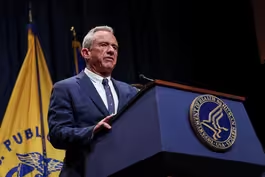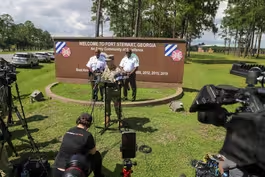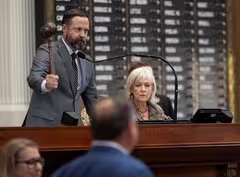
How a county is using AI to help people find common ground
Clip: 8/6/2025 | 9m 1sVideo has Closed Captions
How a Kentucky community is using AI to help people find common ground
The rise of artificial intelligence has sparked concerns across various sectors, including employment, education and national security. But one Kentucky county is taking a different approach, using the technology to boost something far more human: civic engagement. Judy Woodruff reports on an experiment that revealed surprising levels of agreement. It’s part of her series, America at a Crossroads.
Problems playing video? | Closed Captioning Feedback
Problems playing video? | Closed Captioning Feedback
Major corporate funding for the PBS News Hour is provided by BDO, BNSF, Consumer Cellular, American Cruise Lines, and Raymond James. Funding for the PBS NewsHour Weekend is provided by...

How a county is using AI to help people find common ground
Clip: 8/6/2025 | 9m 1sVideo has Closed Captions
The rise of artificial intelligence has sparked concerns across various sectors, including employment, education and national security. But one Kentucky county is taking a different approach, using the technology to boost something far more human: civic engagement. Judy Woodruff reports on an experiment that revealed surprising levels of agreement. It’s part of her series, America at a Crossroads.
Problems playing video? | Closed Captioning Feedback
How to Watch PBS News Hour
PBS News Hour is available to stream on pbs.org and the free PBS App, available on iPhone, Apple TV, Android TV, Android smartphones, Amazon Fire TV, Amazon Fire Tablet, Roku, Samsung Smart TV, and Vizio.
Providing Support for PBS.org
Learn Moreabout PBS online sponsorshipGEOFF BENNETT: The rapid rise of artificial intelligence has sparked concerns across sectors, from employment to education to national security.
But one Kentucky county is taking a different approach, using the emerging technology to boost something far more human, civic engagement.
Our Judy Woodruff reports on an A.I.
experiment that, during these divided times, revealed surprising levels of agreement.
It's part of her ongoing series America at a Crossroads.
JUDY WOODRUFF: About an hour north of Nashville, Bowling Green is Kentucky's third largest city, home to more than 76,000 residents, Western Kentucky University, a strong agricultural tradition, and many large manufacturers, like GM's Corvette assembly line.
For years, those opportunities have drawn new residents from near and far.
That in turn has led to some growing pains.
LAURA TORRES, Homeowner: Three bedrooms, two baths.
It can go anywhere from $1,200, $1,300 and up.
DANIEL TARNAGDA, Refuge BG: Yes, I would say the first thing would be transportation, because those are common issues all the time.
JUDY WOODRUFF: Meanwhile, some longtime residents worry that the pace of growth is threatening what's made this place special.
LAURA GILBERT, Business Owner: We have all of these little houses that are being built right up against I-65.
So when you come through Bowling Green, what do you think?
Was it home of a starter home?
Like, are we home of the chain food restaurant?
DORE HUNT, Farmer: In order to have more cows, to have more milk, we would obviously need more land.
And that's not available to us because it is so competitive in our area.
DOUG GORMAN, Judge Executive, Warren County, Kentucky: Growth is either going to happen to you or for you, and I didn't want to be run over by it.
JUDY WOODRUFF: Judge Executive Doug Gorman is a Republican in charge of Warren County, which includes Bowling Green.
In 2017, he was shocked to learn that, over the next 25 years, that city was expected to double in population.
DOUG GORMAN: Bowling Green was founded in 1798, and we are adding the equivalent of a population of Bowling Green in 25 years.
Well, with that kind of growth, it's everything from housing to schools to day care.
We want to make sure, though, that people are successful here.
And in order to do that, we have to do a lot of planning.
JUDY WOODRUFF: After his election, Gorman convened around 100 community leaders to think through how the county should plan for the coming growth.
He wanted those leaders in turn to reach out to four or five people in their own circles for input.
That's when Jigsaw, the tech incubator at Google, reached out to him.
Its team had developed a new A.I.
tool called Sensemaker that could analyze vast quantities of information quickly.
They asked Gorman, what if you could ask the whole county what it wanted for its future?
YASMIN GREEN, CEO, Jigsaw: With Bowling Green, for the first time, we turned our attention to conversations between policymakers and their constituents.
JUDY WOODRUFF: Yasmin Green is the CEO of Jigsaw, whose mission is to research and develop tools to confront the world's greatest challenges.
In Bowling Green, her team saw one confronting many local governments, lack of civic participation by residents.
YASMIN GREEN: When most of us don't participate, then the people who do are usually the ones that have the strongest opinions, may be the least well-informed, angriest, and then you start to have a caricatured idea of what the other side thinks and believes.
So, one of the most consequential things we could do with A.I.
is to figure out how to help us stay in the conversation together.
WOMAN: You can let your voice be heard.
JUDY WOODRUFF: Earlier this year, the county launched a marketing campaign to ask residents, what could Bowling Green be?
On a Web site, people could add their own ideas and vote proposals up or down.
Over 33 days, nearly 8,000 residents participated, about 10 percent of Bowling Green residents, casting more than a million votes on ideas like more parks, schools, entertainment, affordable housing, and public transit.
With Jigsaw's help, the results were synthesized, categorized, and then shared with the public.
DOUG GORMAN: You know, Judy, if I have a town hall meeting on these two topics, 23 people show up, and I can promise you 20 of them aren't happy, which is fine.
It's OK to have a different -- but they're motivated because they don't want this new thing or they don't want this.
And what we just conducted was the largest town hall in America.
JUDY WOODRUFF: We spoke to just a few participants who filled out the survey.
Daniel Tarnagda was leading soccer practice with his under-18 team, which included players from five countries who've settled in the area and were still struggling with English.
More than 100 languages are spoken in the county's public schools.
DANIEL TARNAGDA: You all need to be able to talk to each other.
JUDY WOODRUFF: Tarnagda himself immigrated here in 2013 from Burkina Faso.
Through soccer, he connected with other immigrants, which led to Refuge BG.
DANIEL TARNAGDA: I know you don't speak English, but you can try.
JUDY WOODRUFF: A nonprofit he started to help newcomers adapt to life here.
DANIEL TARNAGDA: Great job today.
I'm proud of you all.
JUDY WOODRUFF: He says the BG 2050 survey made his community feel included.
DANIEL TARNAGDA: I knew that people want to be part of something.
But if you don't ask, you don't know.
So those questions that start to ask people, really, I think it is one of the best ways to bring people more together.
LAURA TORRES: Three bedrooms, two bath.
JUDY WOODRUFF: A year ago, Laura Torres and her kids moved into this new home built by Habitat for Humanity.
She says more affordable housing and public transit are key to meeting the demand for workers.
And while there are lots of ideas in her community, people struggle to attend county meetings.
LAURA TORRES: You were able to fill out this survey before you went to work, while you were on break, while you were on lunch, while you got home from work and were just winding down.
So I think that's what made the difference is that you didn't have to physically be somewhere to have your voice heard.
JUDY WOODRUFF: Further out in Warren County, Dore Hunt is a sixth-generation farmer who raises dairy cows whose milk then goes straight into the premium ice cream made right up the road at her family's business, Chaney's Dairy Barn.
Yet, even as that business grows, she worries about the future of farming here, as more and more productive land around her gets claimed by new housing developments, roads and schools.
DORE HUNT: Go into those planning and zoning commission meetings and seeing the results, and then watching the dirt being moved and houses going up or the apartments going up, I really did disengage.
I knew that it was going to happen with or without my involvement.
And so it was with the BG 2050 initiative, it got me reinvolved and wanting to share my voice again about my concerns.
LAURA GILBERT: It's kind of what I thought Bowling Green needed.
JUDY WOODRUFF: Laura Gilbert's family also goes back generations in Kentucky.
She recently opened a new business, the Pennyroyal Market, to celebrate the area's food and culture.
It's just one thing she's doing to push back against the pressure to grow so quickly that the community loses what makes it distinct.
LAURA GILBERT: I'm afraid that if we don't intentionally bring our bits and pieces of Kentucky to Bowling Green and set up shop and share it with people, that I'm afraid that we're going to be -- we're just going to -- we will lose our soul.
JUDY WOODRUFF: Some of these priorities are in tension with one another and with what might even be possible.
But on over half the proposals, there was 80 percent agreement over what the community wanted, a reminder to many here that people aren't as divided as they might seem.
DOUG GORMAN: I do think we sometimes get the sense that the whole country is 50/50.
And 50/50 really doesn't work too well, because no one's really wanting to give an inch.
So when it comes out and we have all these ideas with 80 percent approval, they didn't know if the idea was from their neighbor who they didn't get along with politically or whatever the disconnect is.
They just like the idea.
And I think there's something to be said for, we probably should be judging ideas on their merit, not who said them.
JUDY WOODRUFF: The next step, Gorman says, will be putting as many of these ideas into practice as quickly as possible.
His constituents will be watching.
For the "PBS News Hour," I'm Judy Woodruff in Bowling Green, Kentucky.
Composer reimagines Harvey Milk opera while rebuilding life
Video has Closed Captions
Clip: 8/6/2025 | 7m 46s | Composer reimagines his Harvey Milk opera while rebuilding life after traumatic injury (7m 46s)
Expert says mRNA funding cut is 'dangerous' health decision
Video has Closed Captions
Clip: 8/6/2025 | 7m 51s | Federal mRNA funding cut is 'most dangerous public health decision' ever, expert says (7m 51s)
Former prosecutor questions legitimacy of Bondi Russia probe
Video has Closed Captions
Clip: 8/6/2025 | 10m 29s | Former prosecutor questions legitimacy of Bondi’s Russia probe (10m 29s)
News Wrap: Army sergeant accused of shooting 5 soldiers
Video has Closed Captions
Clip: 8/6/2025 | 7m 17s | News Wrap: Army sergeant accused of shooting 5 soldiers at Fort Stewart (7m 17s)
Politicians pick their voters with partisan redistricting
Video has Closed Captions
Clip: 8/6/2025 | 10m 18s | How politicians are picking their voters with partisan redistricting (10m 18s)
Providing Support for PBS.org
Learn Moreabout PBS online sponsorshipSupport for PBS provided by:
Major corporate funding for the PBS News Hour is provided by BDO, BNSF, Consumer Cellular, American Cruise Lines, and Raymond James. Funding for the PBS NewsHour Weekend is provided by...
















